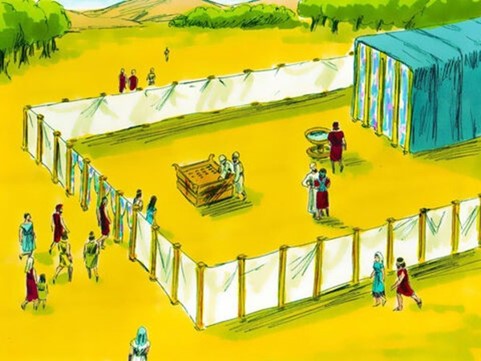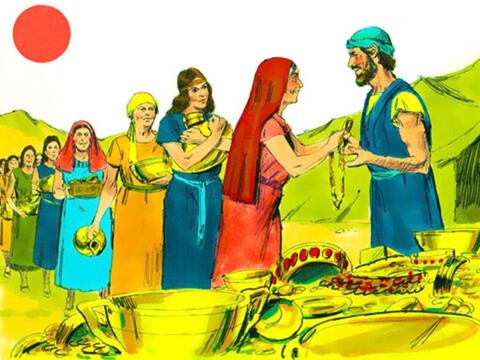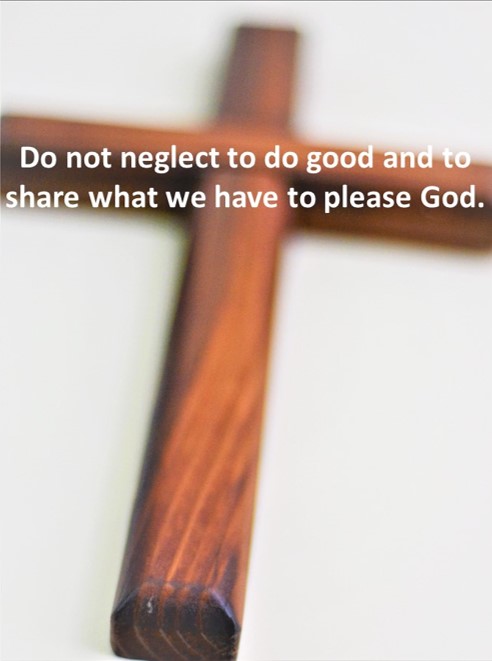Good morning!
Greetings in the name of the Father, the Son, and the Holy Spirit.
“But just as you excel in everything—in faith, in speech, in knowledge, in complete earnestness and in your love for us—see that you also excel in this grace of giving.” – 2 Corinthians 8:7

In the heart of the wilderness, amidst the whispers of the wind and the vastness of the desert, a profound story of generosity and devotion unfolds. In Exodus 36, we find the Israelites engaged in a sacred task: the building of the Tabernacle, a dwelling place for God Himself. This narrative is not just about the construction of a sanctuary; it’s a profound exploration of the human heart’s capacity for generosity when moved by divine inspiration.
As we delve into these ancient verses, we’re invited into a moment of remarkable unity and selflessness. Imagine the scene: a community once bound by the chains of slavery, now free, gathering morning after morning, each person bringing their best to honor God. Their offerings were more than mere materials; they were expressions of gratitude and faith. It was a spontaneous and joyful outpouring, a testament to the transformative power of God’s love.
This story resonates with us today, speaking to the core of what it means to be part of a faith community. It challenges us to consider our approach to giving and service. Are we merely fulfilling obligations, or are we truly offering from a place of gratitude and love? The Israelites teach us that true generosity is not about the size of the gift but the spirit in which it is given.
As we ponder this passage, let us be inspired by their example. May we too cultivate a spirit of generosity that stems from a deep appreciation of God’s gifts to us. Let this journey through Exodus 36 rekindle in us a desire to give and serve wholeheartedly, reflecting the generosity of spirit that God instills in each of His children.

A Heart that Gives Willingly
In the captivating narrative of Exodus 36:3-5, we are presented with an awe-inspiring scene of generosity and devotion. Here, the Israelites, once shackled by the chains of slavery, now bask in the freedom of God’s grace. Their giving, a testament to their transformation, was not a mere transaction but a heartfelt expression of worship and trust in God.
The Apostle Paul, in his letter to the Corinthians, captures the essence of this spirit in 2 Corinthians 9:7: “Each one must give as he has decided in his heart, not reluctantly or under compulsion, for God loves a cheerful giver.” This passage encourages us to reflect on our own motivations and attitudes towards giving. Are we giving out of a sense of duty, or are our offerings infused with joy and gratitude for God’s unfathomable love?
The Israelites’ experience of God’s deliverance and provision became the wellspring of their generosity. They witnessed firsthand the miracles in Egypt, the parting of the Red Sea, and the manna in the desert. Each act of God’s faithfulness imprinted upon their hearts, stirring them to give willingly and abundantly.
In our contemporary context, the call to willing giving remains ever relevant. It challenges us to examine how we view our resources. Do we cling to them as sources of security and status, or do we see them as gifts entrusted to us by God for His purposes? Jesus’ teaching in Matthew 6:21, “For where your treasure is, there your heart will be also,” invites us to align our treasures with our heart’s true home – in God’s kingdom.
This principle of willing giving extends beyond monetary contributions. It encompasses our time, talents, and entire being. When we offer these to God willingly, we participate in the divine dance of generosity that enriches our spiritual lives and fortifies the body of Christ. It’s a journey from mere giving to living a life of generosity.
Willing giving also stands in stark contrast to the prevailing societal norms of accumulation and self-preservation. In a culture that often measures worth by wealth and success, choosing to give freely and joyfully is a radical declaration of faith. It declares that our trust is not in the transient things of this world, but in our eternal, loving Father who provides all we need.
Furthermore, willing giving is a powerful tool for spiritual growth. It molds our hearts to be more like Christ, who gave the ultimate gift of love on the cross. Each act of giving is a step closer to the heart of Jesus, who “though he was rich, yet for your sake he became poor, so that you by his poverty might become rich” (2 Corinthians 8:9).
As we ponder the Israelites’ example of willing giving, let it inspire us to examine our own hearts. May we discover the joy of giving that springs from a deep awareness of God’s grace and love. In doing so, we not only bless others but also experience the true richness of living in God’s abundant grace.

The Diverse Offerings of the People: Unity in Giving
Exodus 36:3-7 paints a picture of an entire community coming together, each person contributing what they had, be it gold, silver, fabrics, or skills. This scene of diverse offerings encapsulates a profound spiritual principle: the body of Christ is composed of varied members, each with unique gifts to offer for the advancement of God’s kingdom.
The Beauty of Diversity in Unity
The diversity in the Israelites’ offerings reflects the multifaceted nature of God’s creation. Each person’s contribution, regardless of its size or form, was vital to the construction of the Tabernacle. Similarly, in the New Testament, Paul speaks to the church in Corinth, illustrating how each believer’s gift is crucial to the functioning of the church body (1 Corinthians 12:12-27). This passage emphasizes that every believer has something unique and valuable to contribute, be it in the form of material resources, talents, time, or spiritual gifts.
Every Gift Matters
In the modern church, this principle remains just as relevant. Often, we might underestimate the value of our contributions, thinking that what we have to offer is too small or insignificant. However, the story of the Israelites teaches us that every offering, when given with a willing heart, plays a crucial part in God’s work. Just as the small strands of blue, purple, and scarlet yarn were woven into the Tabernacle’s fabric, so too are our seemingly small contributions woven into the tapestry of God’s kingdom.
The Impact of Collective Generosity
The collective generosity of the Israelites led to an abundance that exceeded the need. This is a powerful reminder of how God multiplies our offerings. When we pool our resources together in the church, be it through tithes, offerings, volunteer work, or using our talents for ministry, we can achieve far more than what we can individually. It’s a testament to the principle Jesus taught in the feeding of the five thousand: when we offer what we have to God, He can multiply it to meet the needs of many (John 6:1-14).
Encouraging One Another in Generosity
This story also highlights the importance of fostering a culture of encouragement and affirmation within the church. As we acknowledge and appreciate each other’s contributions, we motivate one another to continue giving and serving. Encouragement can be a powerful catalyst, inspiring more members of the congregation to step forward and offer what they can to God’s work.
Reflections for Modern Believers
For modern believers, this narrative invites us to reflect on our own contributions to the work of God. It challenges us to consider not only what we give but also how we perceive and value the gifts of others within our community. It calls us to recognize and celebrate the diversity of gifts among us, understanding that each one is a crucial piece of the larger picture of God’s plan.
In summary, the diverse offerings of the Israelites in building the Tabernacle teach us that in God’s economy, every contribution counts. They remind us that we are part of a larger body, each with a unique role to play, and when we come together in unity and generosity, the impact of our collective offerings is magnified. This unity in diversity is not just a strategy for effective ministry; it’s a reflection of the very nature of God’s kingdom.
Our Gifts for God’s Glory – Practical Application in Today’s World
In Exodus 35, we find Bezalel and Oholiab endowed with divine skills, appointed to oversee the Tabernacle’s construction. This narrative extends far beyond the confines of ancient craftsmanship; it serves as a timeless paradigm for understanding and utilizing our God-given talents and resources for His glory in today’s context.
Recognizing Our Gifts as God-Given
Each one of us, like Bezalel and Oholiab, has been gifted in unique ways. Our talents, whether they lie in artistry, teaching, hospitality, administration, or any other area, are not mere coincidences or self-made skills. They are divine endowments, crafted by our Creator for a specific purpose. Just as Paul reminds us in Ephesians 2:10, we are God’s handiwork, created in Christ Jesus to do good works, which God prepared in advance for us to do. Recognizing our abilities as gifts from God is the first step in using them for His glory.
Cultivating and Offering Our Gifts
Understanding that our talents are from God leads to a responsibility to cultivate and offer them back to Him. This isn’t about achieving personal glory or success but about stewardship of the gifts He has entrusted to us. In the Parable of the Talents (Matthew 25:14-30), Jesus teaches about the importance of using and multiplying what we have been given. We are called to hone our skills and actively seek opportunities to use them in ways that build up the church and glorify God.
Every Role is Vital
In the construction of the Tabernacle, no role was insignificant. From those who worked with gold to those who spun yarn, each task was vital to the completion of the sanctuary. In the same way, every role within the church body is crucial. The Apostle Peter encourages us in 1 Peter 4:10 to use whatever gift we have received to serve others, faithfully administering God’s grace in its various forms. Whether we are leading a congregation, teaching Sunday school, greeting visitors, or helping maintain the church building, each role is a service to God and a vital part of His plan.
The Challenge of Modern Materialism and Individualism
In today’s society, where materialism and individualism often take precedence, dedicating our talents to God’s work can be counter-cultural. It challenges the notion that success is measured by personal gain and recognition. Instead, it embraces a kingdom-focused perspective, where success is about faithfulness and obedience to God’s calling. This perspective transforms our work, hobbies, and even our everyday interactions into opportunities for ministry.
Living Examples of Christ’s Love
By using our gifts for God’s glory, we become living examples of Christ’s love and grace to those around us. Our actions can lead others to Christ, serving as a testament to the transformative power of the Gospel. In doing so, we not only fulfill our God-given purpose but also participate in the larger story of God’s redemptive plan for the world.
Conclusion: A Life of Worshipful Service
In conclusion, the story of Bezalel and Oholiab reminds us that every talent and resource we possess is a gift from God, meant to be used for His glory. Let us embrace this truth with humility and joy, committing ourselves to a life of worshipful service. As we offer our gifts to God, may we do so with the same spirit of dedication and purpose that marked the builders of the Tabernacle, seeking not our glory, but His.
Summary & Life Application
The narrative of Exodus 36, centered around the construction of the Tabernacle, isn’t just a historical account; it’s a rich tapestry of lessons on generosity, stewardship, and the utilization of God-given talents. This ancient story remains incredibly relevant today, offering us vital insights into how we can live out our faith in practical, impactful ways.
A Life of Generous Stewardship
At its core, this narrative teaches us about the heart of giving. The Israelites’ generosity in the wilderness was a response to God’s incredible provision. It was an act of worship, a tangible expression of their gratitude and trust in God. Similarly, our giving, whether it be of our resources, time, or talents, should stem from a heart that recognizes God’s generosity towards us. Just as Jesus taught in Luke 12:34, “For where your treasure is, there will your heart be also.” Our generosity reflects our heart’s orientation.
Recognizing and Utilizing Our Talents
The story of Bezalel and Oholiab emphasizes that every skill and talent is a gift from God, intended for His glory. In today’s world, this translates to a call for us to identify our unique gifts and use them in service to others and to further God’s kingdom. Whether we are skilled in teaching, music, administration, hospitality, or any other area, we are called to use these abilities not for personal acclaim but as instruments of God’s love and grace.
Every Role Matters
Finally, this passage highlights the importance of every role in God’s work. Just as each skill contributed to the construction of the Tabernacle, every role within our church and community is vital. This understanding should inspire us to serve with joy and purpose, knowing that our contributions, no matter how small they may seem, are valuable and appreciated in God’s eyes.
Applying These Principles
As we apply these principles in our lives, let’s strive to be generous in our giving, conscientious in the development and use of our talents, and diligent in our service. Let our actions not only be a testament to our faith but also an invitation to others to experience the love and grace of God. In living out these principles, we not only honor God but also participate in the beautiful tapestry of His redemptive work in the world.

“Do not neglect to do good and to share what you have, for such sacrifices are pleasing to God.” – Hebrews 13:16
